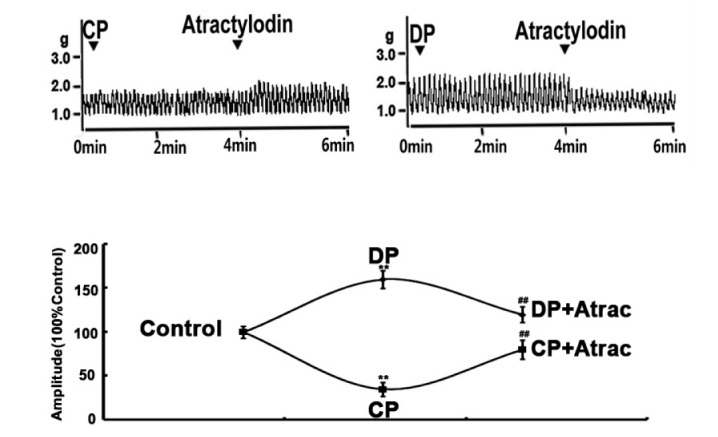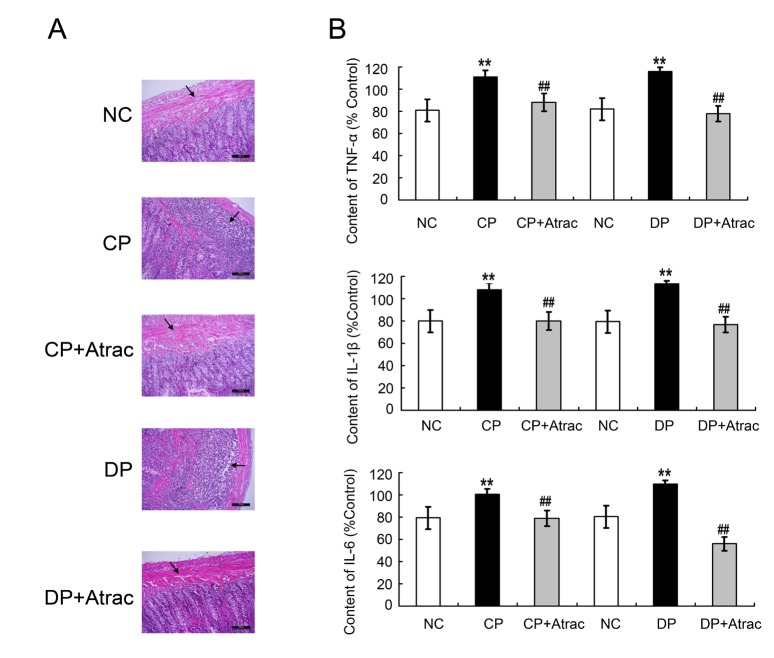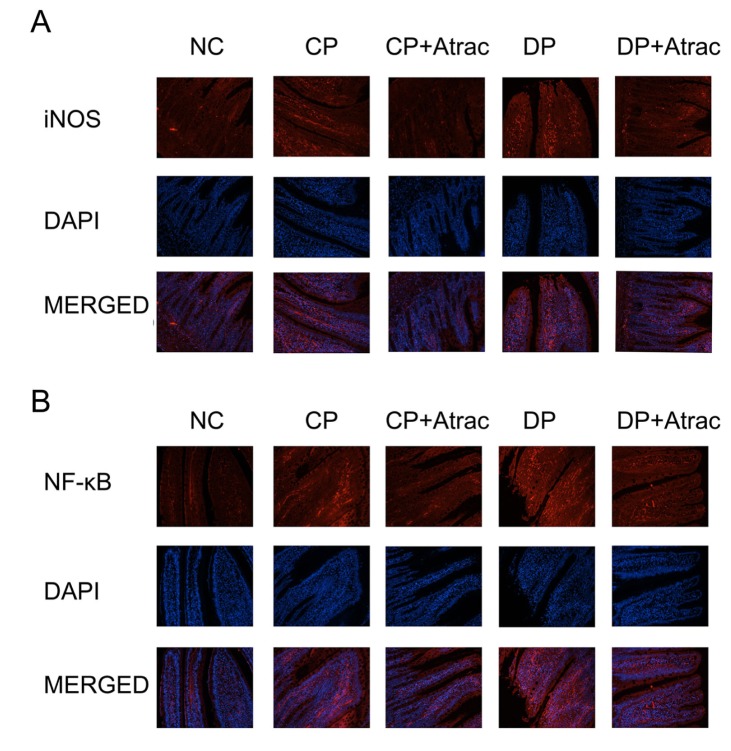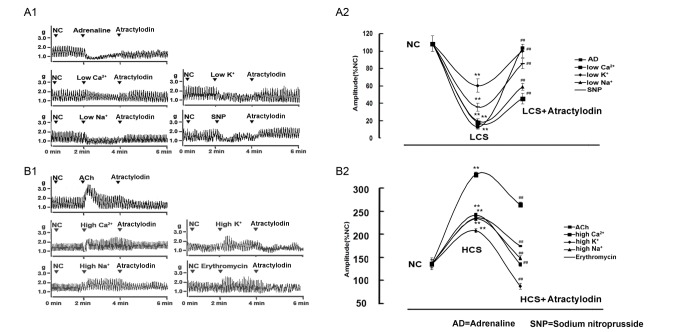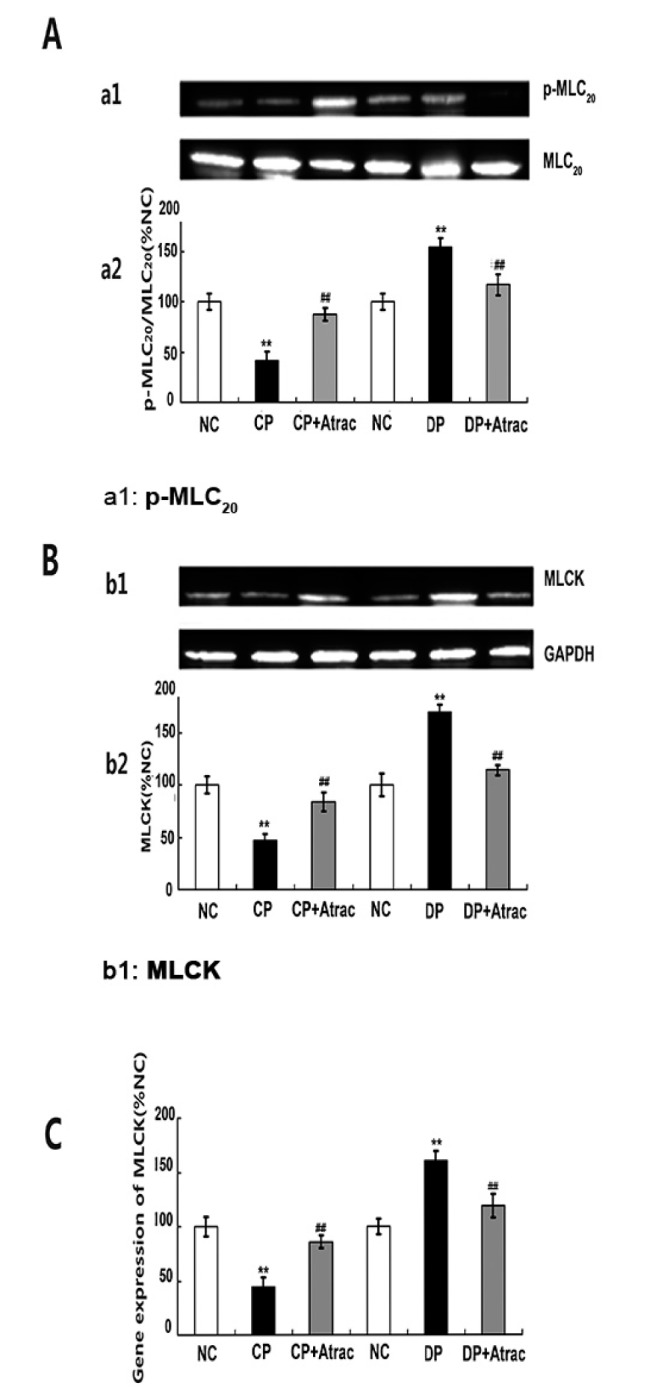Korean J Physiol Pharmacol.
2017 Jan;21(1):1-9. 10.4196/kjpp.2017.21.1.1.
Ameliorative effects of atractylodin on intestinal inflammation and co-occurring dysmotility in both constipation and diarrhea prominent rats
- Affiliations
-
- 1Pharmaceutical College, Dalian Medical University, Dalian 116044, China. linyuandmu2008@qq.com
- KMID: 2371062
- DOI: http://doi.org/10.4196/kjpp.2017.21.1.1
Abstract
- Intestinal disorders often co-occur with inflammation and dysmotility. However, drugs which simultaneously improve intestinal inflammation and co-occurring dysmotility are rarely reported. Atractylodin, a widely used herbal medicine, is used to treat digestive disorders. The present study was designed to characterize the effects of atractylodin on amelioration of both jejunal inflammation and the co-occurring dysmotility in both constipation-prominent (CP) and diarrhea-prominent (DP) rats. The results indicated that atractylodin reduced proinflammatory cytokines TNF-α, IL-1β, and IL-6 in the plasma and inhibited the expression of inflammatory mediators iNOS and NF-kappa B in jejunal segments in both CP and DP rats. The results indicated that atractylodin exerted stimulatory effects and inhibitory effects on the contractility of jejunal segments isolated from CP and DP rats respectively, showing a contractile-state-dependent regulation. Atractylodin-induced contractile-state-dependent regulation was also observed by using rat jejunal segments in low and high contractile states respectively (5 pairs of low/high contractile states). Atractylodin up-regulated the decreased phosphorylation of 20 kDa myosin light chain, protein contents of myosin light chain kinase (MLCK), and MLCK mRNA expression in jejunal segments of CP rats and down-regulated those increased parameters in DP rats. Taken together, atractylodin alleviated rat jejunal inflammation and exerted contractile-state-dependent regulation on the contractility of jejunal segments isolated from CP and DP rats respectively, suggesting the potential clinical implication for ameliorating intestinal inflammation and co-occurring dysmotility.
Keyword
MeSH Terms
Figure
Reference
-
1. Xia YG, Yang BY, Wang QH, Liang J, Wang D, Kuang HX. Species classification and quality assessment of cangzhu (atractylodis rhizoma) by high-performance liquid chromatography and chemometric methods. J Anal Methods Chem. 2013; 2013:497532. PMID: 23984190.
Article2. Committee SP. Pharmacopoeia of the people's republic of China. 9th ed. Beijing: China Medical Science Press;2010.3. Zhang Y, Wang Z, Zhu J, Chen B, Li Y. Determination of atractylodin in rat plasma by HPLC-UV method and its application to a Pharmacokinetic study. Journal of Liquid Chromatography & Related Technologies. 2012; 35:778–787.
Article4. Huo Y, Liu YQ, Bai ZX, Cai Q. Determination of (4E, 6E, 12E)-tetradecatriene-8,10-diyne-1,3-diyl diacetate in rat plasma and tissues by HPLC-UV method and their application to a pharmacokinetic and tissue distribution study. J Anal Methods Chem. 2014; 2014:249061. PMID: 24707441.5. Su TM, Wang MJ, Ruan SB. A research review of chemical constituents and medical function of Rhizoma atractylodis macrocepha1 Lae[J]. Journal of Guiyang University (Natural Sciences). 2008.6. Meng H, Li GY, Dai RH, Ma YP, Zhang K, Zhang C, Li X, Wang JH. Two new polyacetylenic compounds from Atractylodes chinensis (DC.) Koidz. J Asian Nat Prod Res. 2011; 13:346–349. PMID: 21462038.7. Resch M, Heilmann J, Steigel A, Bauer R. Further phenols and polyacetylenes from the rhizomes of Atractylodes lancea and their anti-inflammatory activity. Planta Med. 2001; 67:437–442. PMID: 11488458.8. Nakai Y, Kido T, Hashimoto K, Kase Y, Sakakibara I, Higuchi M, Sasaki H. Effect of the rhizomes of atractylodes lancea and its constituents on the delay of gastric emptying. J Ethnopharmacol. 2003; 84:51–55. PMID: 12499077.
Article9. Żorniak M, Waluga M, Hartleb M. Motility disorders, functional gastrointestinal disorders, inflammatory bowel disease and cardiac rhythm disturbances - is there a link? Review of literature. Curr Drug Targets. 2015; 16:189–193. PMID: 25738294.10. Kuo B, Bhasin M, Jacquart J, Scult MA, Slipp L, Riklin EI, Lepoutre V, Comosa N, Norton BA, Dassatti A, Rosenblum J, Thurler AH, Surjanhata BC, Hasheminejad NN, Kagan L, Slawsby E, Rao SR, Macklin EA, Fricchione GL, Benson H, Libermann TA, Korzenik J, Denninger JW. Genomic and clinical effects associated with a relaxation response mind-body intervention in patients with irritable bowel syndrome and inflammatory bowel disease. PLoS One. 2015; 10:e0123861. PMID: 25927528.
Article11. Andresen V, Whorwell P, Fortea J, Auzière S. An exploration of the barriers to the confident diagnosis of irritable bowel syndrome: a survey among general practitioners, gastroenterologists and experts in five european countries. United European Gastroenterol J. 2015; 3:39–52.
Article12. Guandalini S, Cernat E, Moscoso D. Prebiotics and probiotics in irritable bowel syndrome and inflammatory bowel disease in children. Benef Microbes. 2015; 6:209–217. PMID: 25391345.
Article13. Vicario M, Alonso C, Santos J. Impaired intestinal molecular tightness in the mucosa of irritable bowel syndrome: what are the mediators? Gut. 2009; 58:161–162. PMID: 19136518.
Article14. Mearin F, Perelló A, Balboa A. [Irritable bowel syndrome and inflammatory bowel disease: Is there a connection?]. Gastroenterol Hepatol. 2009; 32:364–372. PMID: 19442413.15. Narin B, Ajaj W, Göhde S, Langhorst J, Akgöz H, Gerken G, Rühm SG, Lauenstein TC. Combined small and large bowel MR imaging in patients with Crohn's disease: a feasibility study. Eur Radiol. 2004; 14:1535–1542. PMID: 15221267.
Article16. Singh P, Staller K, Barshop K, Dai E, Newman J, Yoon S, Castel S, Kuo B. Patients with irritable bowel syndrome-diarrhea have lower disease-specific quality of life than irritable bowel syndrome-constipation. World J Gastroenterol. 2015; 21:8103–8109. PMID: 26185382.
Article17. Dlugosz A, Nowak P, D'Amato M, Mohammadian Kermani G, Nyström J, Abdurahman S, Lindberg G. Increased serum levels of lipopolysaccharide and antiflagellin antibodies in patients with diarrhea-predominant irritable bowel syndrome. Neurogastroenterol Motil. 2015; (12):1747–1754. PMID: 26387872.
Article18. Yoon SR, Lee JH, Lee JH, Na GY, Lee KH, Lee YB, Jung GH, Kim OY. Low-FODMAP formula improves diarrhea and nutritional status in hospitalized patients receiving enteral nutrition: a randomized, multicenter, double-blind clinical trial. Nutr J. 2015; 14:116. PMID: 26530312.
Article19. Lee D, Albenberg L, Compher C, Baldassano R, Piccoli D, Lewis JD, Wu GD. Diet in the pathogenesis and treatment of inflammatory bowel diseases. Gastroenterology. 2015; 148:1087–1106. PMID: 25597840.20. Lin S, Mooney PD, Kurien M, Aziz I, Leeds JS, Sanders DS. Prevalence, investigational pathways and diagnostic outcomes in differing irritable bowel syndrome subtypes. Eur J Gastroenterol Hepatol. 2014; 26:1176–1180. PMID: 25076066.
Article21. Marsh A, Eslick EM, Eslick GD. Does a diet low in FODMAPs reduce symptoms associated with functional gastrointestinal disorders? A comprehensive systematic review and meta-analysis. Eur J Nutr. 2016; 55:897–906. PMID: 25982757.
Article22. Shanahan F, Quigley EM. Manipulation of the microbiota for treatment of IBS and IBD-challenges and controversies. Gastroenterology. 2014; 146:1554–1563. PMID: 24486051.
Article23. Waugh N, Cummins E, Royle P, Kandala NB, Shyangdan D, Arasaradnam R, Clar C, Johnston R. Faecal calprotectin testing for differentiating amongst inflammatory and non-inflammatory bowel diseases: systematic review and economic evaluation. Health Technol Assess. 2013; 17:xv–xix. 1–211. PMID: 24286461.
Article24. La JH, Kim TW, Sung TS, Kang JW, Kim HJ, Yang IS. Visceral hypersensitivity and altered colonic motility after subsidence of inflammation in a rat model of colitis. World J Gastroenterol. 2003; 9:2791–2795. PMID: 14669335.
Article25. Mozaffari S, Esmaily H, Rahimi R, Baeeri M, Sanei Y, Asadi-Shahmirzadi A, Salehi-Surmaghi MH, Abdollahi M. Effects of hypericum perforatum extract on rat irritable bowel syndrome. Pharmacogn Mag. 2011; 7:213–223. PMID: 21969792.26. La JH, Kim TW, Sung TS, Kim HJ, Kim JY, Yang IS. Increase in neurokinin-1 receptor-mediated colonic motor response in a rat model of irritable bowel syndrome. World J Gastroenterol. 2005; 11:237–241. PMID: 15633223.
Article27. Zou BC, Dong L, Wang Y, Wang SH, Cao MB. Expression and role of 5-HT7 receptor in brain and intestine in rats with irritable bowel syndrome. Chin Med J(Engl). 2007; 120:2069–2074. PMID: 18167178.
Article28. Peng LH, Yang YS, Gang S, Wang WF. A new model of constipation-predominant irritable bowel syndrome in rats. World Chin J Digestol. 2004; 12:112–116.29. von Stein P, Lofberg R, Kuznetsov NV, Gielen AW, Persson JO, Sundberg R, Hellstrom K, Eriksson A, Befrits R, Ost A, von Stein OD. Multigene analysis can discriminate between ulcerative colitis, Crohn's disease, and irritable bowel syndrome. Gastroenterology. 2008; 134:1869–1881. quiz 2153-2154. PMID: 18466904.
Article30. Zhu J, Chen L, Xia H, Luo HS. Mechanisms mediating CCK-8S-induced contraction of proximal colon in guinea pigs. World J Gastroenterol. 2010; 16:1076–1085. PMID: 20205277.
Article31. Zhao J, Liao D, Gregersen H. Phasic and tonic stress-strain data obtained in intact intestinal segment in vitro. Dig Dis Sci. 2008; 53:3145–3151. PMID: 18461453.32. Zhi G, Ryder JW, Huang J, Ding P, Chen Y, Zhao Y, Kamm KE, Stull JT. Myosin light chain kinase and myosin phosphorylation effect frequency-dependent potentiation of skeletal muscle contraction. Proc Natl Acad Sci U S A. 2005; 102:17519–17524. PMID: 16299103.
Article33. Srinivas SP, Satpathy M, Guo Y, Anandan V. Histamine-induced phosphorylation of the regulatory light chain of myosin II disrupts the barrier integrity of corneal endothelial cells. Invest Ophthalmol Vis Sci. 2006; 47:4011–4018. PMID: 16936117.
Article34. Chitano P, Voynow JA, Pozzato V, Cantillana V, Burch LH, Wang L, Murphy TM. Ontogenesis of myosin light chain kinase mRNA and protein content in guinea pig tracheal smooth muscle. Pediatr Pulmonol. 2004; 38:456–464. PMID: 15376333.
Article35. Andersen CL, Jensen JL, Ørntoft TF. Normalization of real-time quantitative reverse transcription-PCR data: a model-based variance estimation approach to identify genes suited for normalization, applied to bladder and colon cancer data sets. Cancer Res. 2004; 64:5245–5250. PMID: 15289330.
Article36. Gong Z, Chen Y, Zhang R, Wang Y, Yang Q, Guo Y, Weng X, Gao S, Wang H, Zhu X, Dong Y, Li Y, Wang Y. Pharmacokinetics of two alkaloids after oral administration of rhizoma coptidis extract in normal rats and irritable bowel syndrome rats. Evid Based Complement Alternat Med. 2014; 2014:845048. PMID: 25309613.37. Zhu X, Liu Z, Qu H, Niu W, Gao L, Wang Y, Zhang A, Bai L. The effect and mechanism of electroacupuncture at LI11 and ST37 on constipation in a rat model. Acupunct Med. 2016; 34:194–200. PMID: 26561562.
Article38. Sung B, Park S, Ha YM, Kim DH, Park CH, Jung KJ, Kim MS, Kim YJ, Kim MK, Moon JO, Yokozawa T, Kim ND, Yu BP, Chung HY. Salicylideneamino-2-thiophenol modulates nuclear factor-κB through redox regulation during the aging process. Geriatr Gerontol Int. 2015; 15:211–219. PMID: 25164597.
Article39. Suschek CV, Schnorr O, Kolb-Bachofen V. The role of iNOS in chronic inflammatory processes in vivo: is it damage-promoting, protective, or active at all? Curr Mol Med. 2004; 4:763–775. PMID: 15579023.
Article40. Pedersen N. EHealth: self-management in inflammatory bowel disease and in irritable bowel syndrome using novel constant-care web applications. EHealth by constant-care in IBD and IBS. Dan Med J. 2015; 62:B5168. PMID: 26621403.41. Gareau MG, Silva MA, Perdue MH. Pathophysiological mechanisms of stress-induced intestinal damage. Curr Mol Med. 2008; 8:274–281. PMID: 18537635.42. Naito Y, Takagi T, Uchiyama K, Katada K, Yoshikawa T. Multiple targets of carbon monoxide gas in the intestinal inflammation. Arch Biochem Biophys. 2016; 595:147–152. PMID: 27095232.
Article43. Sánchez de Medina F, Romero-Calvo I, Mascaraque C, Martínez-Augustin O. Intestinal inflammation and mucosal barrier function. Inflamm Bowel Dis. 2014; 20:2394–2404. PMID: 25222662.
Article44. Ozaki H, Hori M, Kinoshita K, Ohama T. Intestinal dysmotility in inflammatory bowel disease: mechanisms of the reduced activity of smooth muscle contraction. Inflammopharmacology. 2005; 13:103–111. PMID: 16259732.
Article45. Gasparini C, Feldmann M. NF-κB as a target for modulating inflammatory responses. Curr Pharm Des. 2012; 18:5735–5745. PMID: 22726116.46. Debnath T, Kim da H, Lim BO. . Molecules. 2013; 18:7253–7270. PMID: 23783459.47. Hur SJ, Kang SH, Jung HS, Kim SC, Jeon HS, Kim IH, Lee JD. Review of natural products actions on cytokines in inflammatory bowel disease. Nutr Res. 2012; 32:801–816. PMID: 23176791.
Article48. Chiu WC, Huang YL, Chen YL, Peng HC, Liao WH, Chuang HL, Chen JR, Yang SC. Synbiotics reduce ethanol-induced hepatic steatosis and inflammation by improving intestinal permeability and microbiota in rats. Food Funct. 2015; 6:1692–1700. PMID: 25910227.
Article49. Xiong Y, Chen D, Lv B, Liu F, Yao Q, Tang Z, Lin Y. Effects of ginsenoside Re on rat jejunal contractility. J Nat Med. 2014; 68:530–538. PMID: 24658813.
Article50. Liu FF, Chen DP, Xiong YJ, Lv BC, Lin Y. Characteristics of diprophylline-induced bidirectional modulation on rat jejunal contractility. Korean J Physiol Pharmacol. 2014; 18:47–53. PMID: 24634596.
Article51. Chen D, Xiong Y, Wang L, Lv B, Lin Y. Characteristics of emodin on modulating the contractility of jejunal smooth muscle. Can J Physiol Pharmacol. 2012; 90:455–462. PMID: 22452333.
Article52. Sun B, Hu C, Fang H, Zhu L, Gao N, Zhu J. The effects of lactobacillus acidophilus on the intestinal smooth muscle contraction through PKC/MLCK/MLC signaling pathway in TBI mouse model. PLoS One. 2015; 10:e0128214. PMID: 26030918.
Article53. Zhang J, Qiao Y, Le J, Sun D, Guan Y, Li Z. Olanzapine may inhibit colonic motility associated with the 5-HT receptor and myosin light chain kinase. Psychiatry Investig. 2016; 13:232–238.
Article
- Full Text Links
- Actions
-
Cited
- CITED
-
- Close
- Share
- Similar articles
-
- Two Cases of Slow Transit Constipation Associated with Delayed Gastric Emptying Treated by Total Abdominal Colectomy
- Bowel movement alterations predict the severity of diverticular disease and the risk of acute diverticulitis: a prospective, international study
- A Case of Gastrointestinal Dysmotility and Small Intestinal Bacterial Overgrowth in a Patient with Hepatocellular Carcinoma
- Aging Decreases the Density of Colonic Interstitial Cells of Cajal Associated With Constipation in Rats
- Colonic dysmotility and morphological abnormality frequently detected in Japanese patients with irritable bowel syndrome

